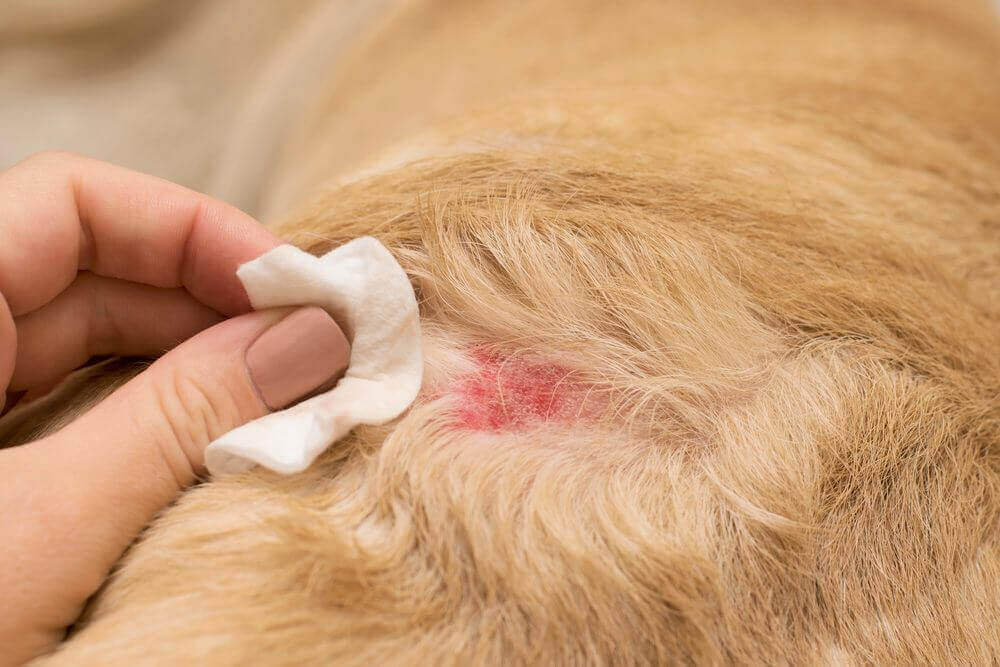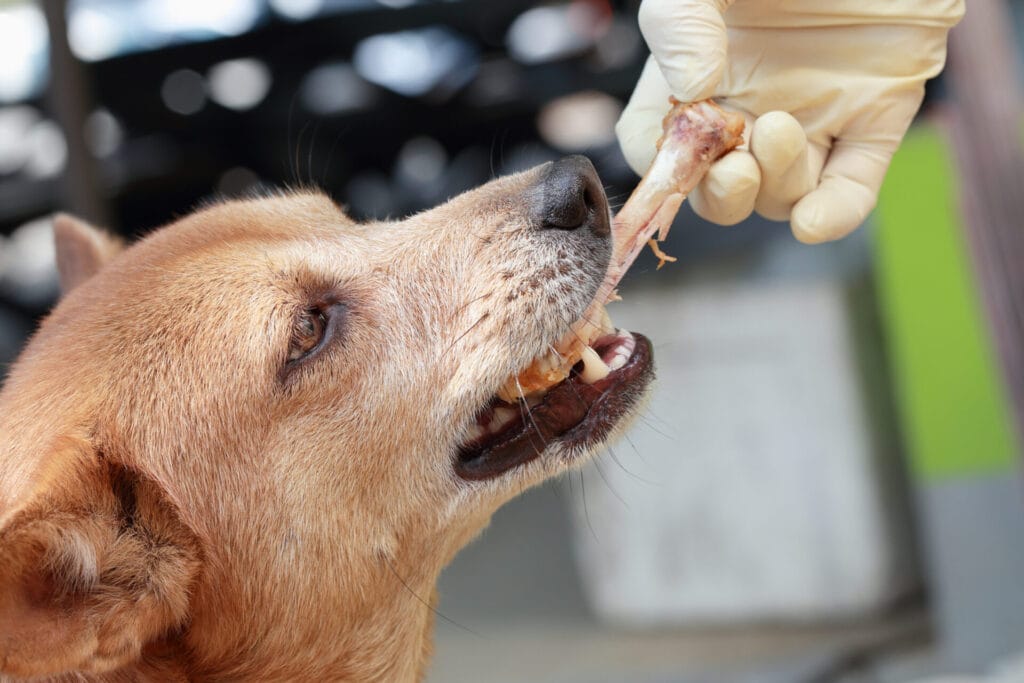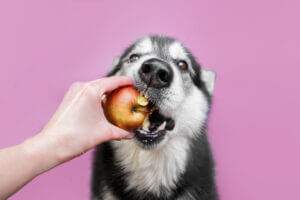Is your dog suddenly itching, scratching, and paw-chewing? These are the most common symptoms of chicken allergy in dogs. Dogs, just like humans, can have seasonal allergies and allergies or sensitivities to food. If the main meaty component of your dog’s food is chicken protein, you may have found your culprit. Chicken allergy is the second most common food allergy in dogs after beef, and as much as 15% of dogs suffer from it, according to BMC Veterinary Research.
If you’ve changed your pet’s food type or brand recently, it’s most likely the problem. However, dogs can also develop a chicken allergy through exposure, which means the more you feed your pet chicken, the more likely he is to become allergic to it.
This intolerance means you have to keep a beady eye on how your dog responds to different food sources. It’s also worth noting that if your dog has a chicken protein allergy, it doesn’t automatically mean that he is allergic to turkey or duck – an allergy to all poultry is very uncommon.
What you need to know is that chicken is the go-to of the dog food world. There’s no denying that dogs love the taste of chicken, and it’s also convenient that it’s a lean protein source that’s also cheap compared to lamb and beef. This makes chicken an affordable and viable protein source for dogs.
As a result, most dog food and treats feature chicken as their main ingredient. While chicken is a worthy protein source, if your dog doesn’t respond well to it, it’s not the right choice for him.
Spot & Tango has a range of dog food options fit for dogs with food sensitivities, including chicken protein allergy.
Can Dogs Be Allergic To Chicken?

Yes, dogs can develop allergies to chicken, just as humans can have food allergies. In fact, chicken is one of the most common protein allergens for dogs, despite being a staple ingredient in many commercial pet foods. Food allergies occur when a dog’s immune system mistakenly identifies a specific protein—such as chicken—as a harmful substance, triggering an allergic reaction.
However, identifying a chicken allergy isn’t always straightforward. Allergy symptoms, such as itching, digestive upset, and skin irritation, can look similar regardless of the allergen. Additionally, these symptoms may overlap with other health issues like seasonal allergies, environmental sensitivities, or underlying conditions such as parasitic infections. Because of this, assuming your dog has a chicken allergy without proper diagnosis can lead to unnecessary dietary restrictions or ineffective treatments.
It’s also worth noting that some dogs react not to chicken itself but to low-quality chicken by-products, fillers, or heavily processed chicken meals found in some commercial dog foods. These ingredients may contain additives or lower-grade proteins that trigger sensitivities. In contrast, higher-quality, fresh chicken sources—like those used in human-grade dog food—are often easier for dogs to digest and less likely to cause issues.
The best way to determine if your dog is truly allergic to chicken is through an elimination diet trial, guided by a veterinarian. This process involves feeding your dog a novel protein or hydrolyzed diet—free from chicken and other potential allergens—for several weeks. If symptoms improve and then return when chicken is reintroduced, a food allergy is likely the cause.
While diagnosing a chicken allergy takes time and patience, it is essential for finding the right treatment plan and ensuring your pup gets the nutrition they need without discomfort. If you suspect your dog has a food allergy, consulting with a vet can help pinpoint the root cause and guide you toward the best dietary choices.
How To Tell If Your Dog Is Allergic To Chicken
You may be wondering: “Is my dog allergic to chicken, and if so, what caused it?”. In most instances, dogs develop an allergy to chicken over time from exposure. It could also have something to do with their genetics.
Several other factors may be at play, such as the environment. If your dog has shown different food sensitivities before, there’s a possibility that he is at risk of a chicken allergy too.
Scientific researchers interested in the world of dogs are hard at work investigating possible causes for the dog immune system to express an allergy. While some information is out there, more clarity is needed.
There is some proof that breeders using the same breeding dogs with chicken intolerance are likely to spread the allergy. While chicken allergy can affect any dog breed, some are more susceptible, including Labradors, Golden Retrievers, Cocker Spaniels, and German Shepherds.
What are the symptoms of a chicken allergy in dogs? Well, for the most part, it’s a lot of itching and scratching, but there’s more to the chicken allergy than that. In fact, the symptoms can be quite concerning and, if left untreated, can become severe.
What Does Chicken Allergy in Dogs Look Like?
How can I tell if my dog is allergic to chicken? This question isn’t the most straightforward one to answer, as there’s always a risk of assigning blame to food when there may be another issue at play. Of course, one should never assume when it comes to chicken intolerance in dogs, but there are tell-tale signs.

First, familiarize yourself with the common signs of chicken allergy in dogs before assuming that it’s the food causing discomfort. If you have a dog allergic to chicken, symptoms may present as follows:
Most Common Dog Chicken Allergy Symptoms
- Your dog suddenly starts to itch and scratch, especially around his face – this impacts the ears and mouth areas most commonly.
- Your dog has developed a rash or has inflamed skin.
- There are increased occurrences of floor-scooting or licking the rear area.
- Your dog starts licking or chewing his paws consistently.
- You notice hair loss or bleeding skin in some areas. Often the hair loss is attributed to rubbing the itchy spot on furniture or carpets.
- Your dog is showing signs of bloating and gassiness.
- You notice that your dog suddenly has diarrhea or is vomiting after mealtimes.
A way to get to the bottom of it quickly is to pay the cost of an allergy test at your local vet. The allergy test is the fastest but also the costliest route.
What is the Most Effective Way to Treat Your Dog’s Chicken Food Allergy?
If your dog is showing signs of allergy to chicken, you’re sure to be concerned. You may wonder what your treatment options are and the good news is that with the right treatment plan, everything will be just fine.
The most effective way to ensure your dog’s comfort is to eliminate the offending food source from his diet immediately.

You can transition your dog back onto his previous diet, but if there’s a valid reason for the food change to start with, this may not be an option for you. It stands to reason that your vet should be the very first person you consult. He/she will be able to determine if your dog’s reaction is indeed related to a chicken allergy or not.
In most instances, the vet will recommend a special diet or limited ingredient food that doesn’t contain chicken, such as the Spot & Tango range. Once your dog’s allergy has cleared, you can try reintroducing your dog to chicken-based foods to see if the cause was the chicken.
What is the Best Dog Food for Chicken Allergy?
Navigating a diet with an allergy-prone dog can be tricky. Is there an ideal dog food for a dog with chicken allergies?
It’s important to find food sources that are nutritionally dense without chicken. Many dog foods have chicken byproducts hidden in the ingredient list, so be sure to read the label. Someone may pick up a bag titled “Beef Kibble” when the food also contains chicken.
A limited-ingredient chicken-free food, like Spot & Tango‘s Beef & Barley or Cod & Salmon UnKibble recipes, is a great option! Learn more about the line of FreshDry food here.

Spot & Tango offers both FreshDry and fresh frozen dog food options. The team of veterinary nutritionists formulated limited-ingredient diets that are complete & balanced, as per AAFCO’s recommendations. The dog food from Spot & Tango never contains any preservatives, additives, grain fillers, meat meals, artificial chemicals, or hormones. Excluding low-quality ingredients and fillers from a diet is particularly helpful for sensitive dogs (susceptible to allergies or adverse reactions to certain foods).
Spot & Tango offers a variety of chicken-free options, like beef, lamb, turkey, salmon, and more. You can create a custom meal plan based on your dog‘s specific dietary needs. In short, your sensitive dog gets whole, fresh-ingredient meals delivered right to their doorstep.
How Common Are Chicken Allergies in Dogs?
Chicken is one of the most frequently reported food allergens for dogs. Studies suggest that chicken allergies and food allergies affect between 10% – 15% of dogs. Chicken allergies are a common culprit alongside beef, dairy, and wheat. However, many dogs tolerate chicken well, and adverse reactions can sometimes be due to sensitivities rather than true allergies.
A true food allergy occurs when a dog’s immune system overreacts to chicken proteins, leading to symptoms such as itchy skin, digestive upset, or chronic ear infections. In contrast, some dogs experience food intolerances—which are more common than allergies—causing mild digestive discomfort rather than an immune response. Additionally, some dogs react poorly to low-quality chicken meals, by-products, or processed fillers, rather than fresh, high-quality chicken sources.
Because food allergies can mimic other health conditions, pinpointing the exact cause requires a proper diagnosis, typically through an elimination diet trial under veterinary supervision. If a chicken allergy is confirmed, switching to an alternative protein source—such as turkey, fish, or lamb—can help manage symptoms and keep your pup healthy.
While chicken allergies are not the most prevalent canine health issue, they can significantly impact a dog’s well-being. If you suspect your dog has a food-related sensitivity, working with a vet to determine the cause and find a high-quality, well-balanced diet is the best course of action.
How Is a Chicken Allergy in Dogs Diagnosed?
Diagnosing a chicken allergy in dogs requires a systematic approach since food allergies share symptoms with other conditions like environmental allergies, parasites, or infections. Unlike a simple blood test, which isn’t always reliable for food allergies, the gold standard for diagnosis is an elimination diet trial guided by a veterinarian.
An elimination diet trial involves feeding your dog a novel protein or hydrolyzed protein diet—one that contains no chicken or common allergens—for 8 to 12 weeks. During this period, it’s crucial to avoid all other food sources, including treats, flavored medications, and table scraps, to ensure accurate results. If your dog’s symptoms improve during the trial and return once chicken is reintroduced, this confirms a food allergy.
Because food allergies can sometimes be confused with food intolerances or ingredient sensitivities, a vet may also recommend additional tests to rule out other potential causes of your dog’s symptoms. In some cases, switching to a high-quality, fresh diet that eliminates artificial additives and low-grade fillers can also help determine if your dog is reacting to chicken itself or the processing methods used in some commercial dog foods.
If a chicken allergy is confirmed, the best treatment is permanent removal of chicken from your dog’s diet. Fortunately, many alternative protein sources, such as lamb, turkey, salmon, and venison, can provide the necessary nutrients without triggering an allergic reaction. Working closely with a veterinarian ensures your dog transitions to a balanced, allergen-free diet that supports their long-term health.
Frequently Asked Questions
Here are the most common questions pet parents ask about chicken allergy in dogs. Perhaps they can help you too.
- What are the tell-tale signs of chicken allergy in dogs?
Itching, scratching, paw licking/chewing, carpet-scooting, and rear-end licking.
- How common is chicken allergy in dogs?
Chicken allergy is more common in dogs than most people think. 15% of dogs suffer from the allergy.
- Can chicken cause diarrhea in dogs?
If your dog has diarrhea after eating chicken, you may worry that chicken is the culprit. The short answer is that, yes, chicken can cause diarrhea in dogs. This is especially true if the dog has an allergy to chicken or if the chicken is undercooked when fed to the dog. If your dog has an adverse effect every time you feed him chicken, you should remove chicken from their diet and speak with your vet about possible treatment options.
- If a dog is allergic to chicken, will it also be allergic to turkey?
While it is possible that your dog can also be allergic to other forms of poultry, it is actually very rare.
Final Thoughts

While the symptoms of chicken allergy in dogs are relatively easy to pick up on, it’s important to note that your dog could be allergic to something else in the food.
Other possible allergens include milk, soy, beef, eggs, corn, or wheat. All of these ingredients are commonly included in dog foods.
It’s essential to chat with your vet about allergy testing or to gather further health-related advice. Spot & Tango’s recipes section is jam-packed with chicken-free meal ideas for your dog, be sure to check it out!




















